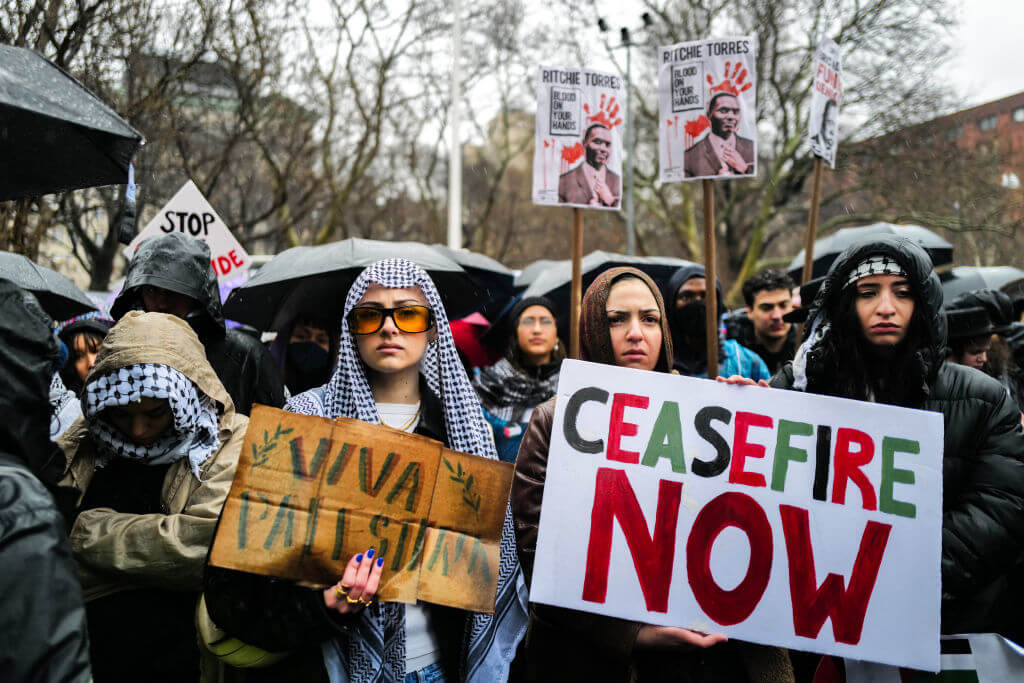Writers reject festival invite from PEN America over Gaza war response
Jewish author Naomi Klein is one of several writers and activists to accuse the organization of violating its ‘professed commitment to peace’

Several writers and activists withdrew from participation in PEN America’s World Voices Festival, citing what they saw as the organization’s inadequate support of Palestinian artists. Photo by Getty Images
Nine writers and activists, including Naomi Klein and Michelle Alexander have declined to participate in PEN America’s annual World Voices festival over the organization’s response to Israel’s war with Hamas, saying that the free speech watchdog has been “missing-in-action when Palestinian speech was under attack.”
In an open letter shared today on Literary Hub, the writers accused PEN America, an advocacy group focused on freedom of expression, of failing to “stand firmly” with Palestinian writers “against the powers that have oppressed and dispossessed them for the last 75 years.” The letter notes that the Israeli invasion of Gaza has destroyed universities, museums and libraries, and killed journalists, writers and artists.
In a statement to the Forward, PEN America said that it had reached out to the letter writers and hoped to “step up the dialogue about how best to fulfill our mission of defense of free expression and dialogue across difference at this time.”
“We are listening and are always committed to do better,” the statement added.
A spokesperson for the organization said that PEN had been working confidentially with artists at risk in Gaza, but declined to elaborate further on that work. The organization has released a number of statements commenting on the war, including in a February news release that noted “the war in Gaza has exacted a calamitous death toll on Palestinian writers and artists, and led to the destruction of treasured cultural centers, libraries and educational institutions.” (The release also commented that the “premeditated Oct. 7 attacks on Israel targeted an open air music festival, as well as Israeli writers and artists who were murdered or taken hostage.”)
The group’s other statements on the war have included a condemnation of campus antisemitism and doxxing campaigns against college students; warnings about the cancellation of cultural events tied to Palestinian artists; and tributes to writers killed by Israeli airstrikes, such as the scholar Refaat Alareer.
Founded by Salman Rushdie in 2004, the World Voices Festival is a prominent international literary event; PEN America has not yet released a list of speakers for the 2024 festival, but the letter writers said they had each been approached to serve as speakers and moderators. Aside from Klein, author of Doppelganger, and Alexander (The New Jim Crow), signatories to the letter included the Palestinian novelists Isabella Hammad and Zaina Arafat, as well as Dimi Khalidi, director of the legal aid organization Palestine Legal. One signer was anonymous.
After a separate open letter in February called on PEN to mount a more vigorous response to the situation in Gaza, PEN America released a general statement mourning “the immense loss of Palestinian lives.”
The letter’s signatories argued that PEN America had failed to offer “substantial coordinated support” to Palestinian artists, or to issue any reports “highlighting the scale and scope of the attacks on writers in Gaza.” PEN America issued one such report on threats to Ukrainian culture nearly 10 months after Russia’s 2022 invasion, and launched an emergency fund for visual artists affected by that conflict.
It is not the first criticism of PEN America over Gaza. In January, two novelists canceled events with the organization after it hosted Mayim Bialik, an actress, author and outspoken supporter of Israel who had opposed calls for a ceasefire in December. Palestinian American writer Randa Jarrar then attended and protested the Bialik event, using a speaker to play the names of writers killed in Gaza until security guards removed her from the venue.
While they noted that PEN America had been receptive to criticism in the past, the letter’s nine writers said they wanted to see the organization make further changes.
“We hope that our decision not to participate will add to existing efforts to yield concrete and lasting change at a time that calls for moral courage from us all,” they wrote.















